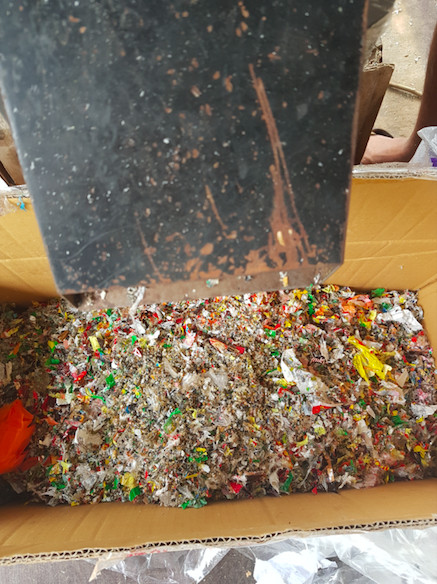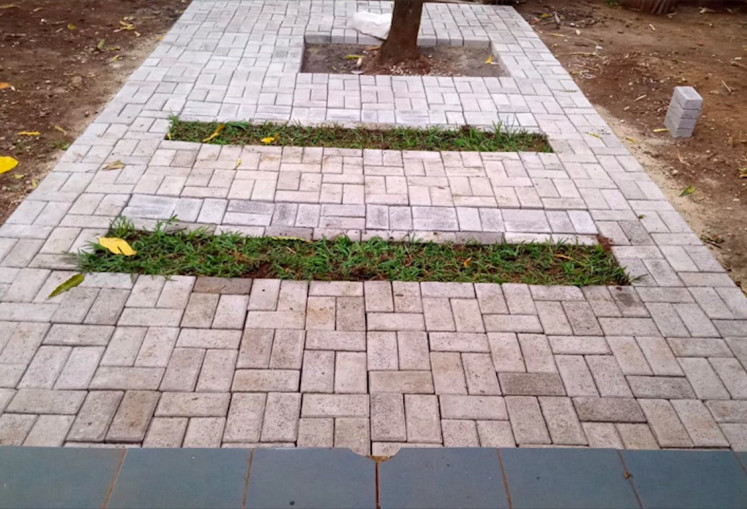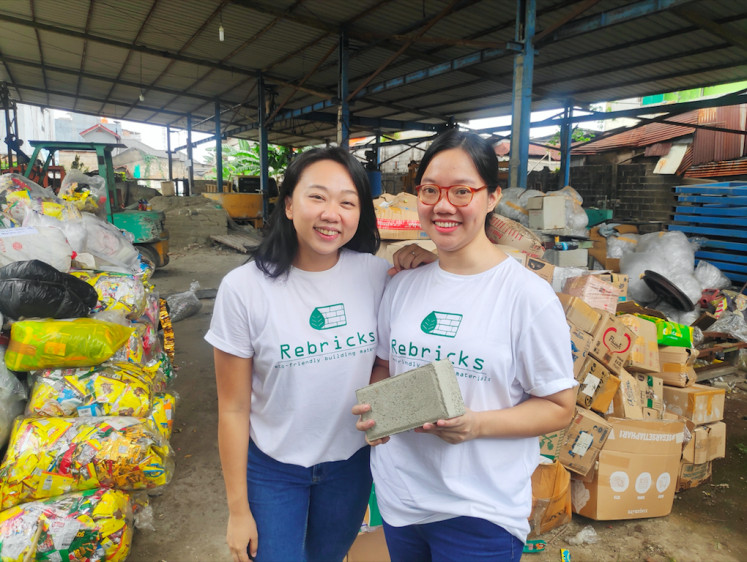Popular Reads
Top Results
Can't find what you're looking for?
View all search resultsPopular Reads
Top Results
Can't find what you're looking for?
View all search resultsAre eco-friendly bricks the future of Indonesia's building material?
Change text size
Gift Premium Articles
to Anyone
Eco-friendly building materials can be a solution to minimize plastic waste, but challenges, including costly production, persist.
In recent years, Indonesia has had more emerging eco-friendly building materials.
Ovy Sabrina, the cofounder of Rebricks Indonesia, a start-up company specializing in producing eco-friendly bricks, shared her excitement over the plastic-waste donations she received to create an eco-friendly building material.
"The culture has accustomed people to get paid for each plastic they donate. I was surprised that many housewives donated their plastic waste to us for free," said Ovy.
Ovy said that each square meter of paving bricks contains about 880 plastic sachets.
Bricks and paving blocks are essential materials for development projects across the country. However, increase in production can threaten the environment and public health. The situation is not aided by the fact that Indonesia is the second-biggest marine polluter in the world, after China.
Fight against plastic waste
Indonesia is currently facing a plastic-waste emergency. According to Kompas, The Indonesia Olefin, Aromatic and Plastic Industry Association (INAPLAS) and Statistics Indonesia (BPS) reported that Indonesia produced at least 66 million tons of plastic waste.
In 2019, The Jakarta Post reported that the Indonesian Institute of Sciences (LIPI) found that microplastics have contaminated 89 percent of anchovies fished in Indonesian waters.
Indonesians were thus expected to ingest up to 1,500 microplastic particles within a year when consuming marine animals. However, scientists have yet to find the health implications of consuming plastic.
Aiming to contribute to minimizing the country’s plastic problems, Ovy had an idea to create eco-friendly building materials after seeing non-recyclable plastic waste piling up at the local landfill. She partnered up with fellow-student Novita Tan, whom she met in their university years, and established Rebricks in 2019.
As one of the few producers of eco-friendly building materials in Indonesia, Ovy works with local households and warung (food stalls) to collect non-economic-value plastic waste like coffee sachets to create eco-friendly concrete bricks.
She explained that her production is now overflowing with the amount of plastic waste she received. Ovy can accept at least 50 kilograms of plastic waste from each drop point.
Toni Permana, a Bandung native who creates eco-friendly paving blocks, also shared a similar experience. According to Kata Data, Bandung produces 1,500 tons of waste daily.
Toni, however, knew his business would not bring much profit. Instead of overwhelming himself, he created a local-waste bank called Bank Sampah Sukamaju Sejahtera, located in kampung (village) Sukamaju, to collect the needed materials.
"I will continue to collect this plastic waste while I can," said Toni, who also works with 12 other waste-bank workers to clean up their neighborhood's waste.
Together they collect the plastic waste donated by locals on every Monday and Friday from 3:30 p.m. to 5 p.m. For every plastic waste submitted, the locals receive an amount of money, which they save in the waste bank. They can withdraw their savings once a year, during the Idul Fitri break, for example.
“I couldn’t exactly remember but there are individuals who got Rp 300,000 [US$20] to Rp 3 million from donating their plastic waste to us,” Toni shared.
"We try to implement the government's discourse on recycling plastic waste. Often, their regulations are mostly written on the white paper, but it's hard to be carried out in the field.”
Challenges vs demand
Owning an environmentally friendly building material is still challenging. According to Ovy, she has not been able to give a reasonable price point for the communities. This is due to the production cost of the bricks themselves.
Based on market research, regular bricks’ production cost can range from Rp 650 to Rp 4,000, whereas Ovy's started from Rp 50,000.
Despite the challenges, there is a potential market for the product. Ovy and Toni shared that there has been an increasing demand from the public. This is due to the presence of social media and more awareness created by society.
"I don't have the exact [order] count," shared Toni, adding that his team is currently overflowing with orders as he still manually manufactures each paving block.
Toni noted that the production of his paving materials still involves a burning process. The eco-friendly material's manufacturing process thus emits a display of carbon dioxide.
"I wouldn't call my products environmentally friendly products. But hopefully, in the future, I'll be able to afford an air purifier," Toni shared.
Furthermore, Toni is also hopeful that he will be able to improve his team's research system to create various products from plastic waste.
"We hope we'll be able to create our eco-bricks because we don't have enough support to test the experiment," Toni shared.
Meanwhile, Ovy shared that Rebricks has received twice as many orders as in the past year, with at least 14,000 square m of eco-bricks ordered from 2021 to 2022. Ovy added that she mainly works with fast-moving consumer goods or environmental activists planning to build their own eco-friendly houses.
"I hope that in the future we can provide a more-affordable price, if there is enough interest in the eco-friendly bricks," Ovy said.
Trend or here to stay?
For the time being, there is also the question of whether eco-friendly bricks will stay or not.
Tiene Gunawan, Indonesia Country Director, Clean Cities, Blue Ocean, shared that all parties, activists and business owners, have a role in disseminating information about eco-friendly building materials. Tiene herself has built her own using eco-friendly bricks.
"As much as I can, I want to be responsible to mother nature," Tiene said.
Tiene explained that if communities continuously mined natural resources like sands and stones, it could damage the existing ecosystem. At least turning waste into eco-friendly building material is one way to reuse non-recyclable waste faster.
Tiene took the example of the Jatibarang landfill in Semarang, described as "almost collapsed”. Kompas reported that at least 1,000 tons of waste were discarded in the area. Thus, programs or businesses like eco-friendly building materials are helpful.
"People need to be more aware that even organic waste takes time to decompose. So can you imagine how much waste we can produce if we keep on consuming plastic?" Tiene added.













